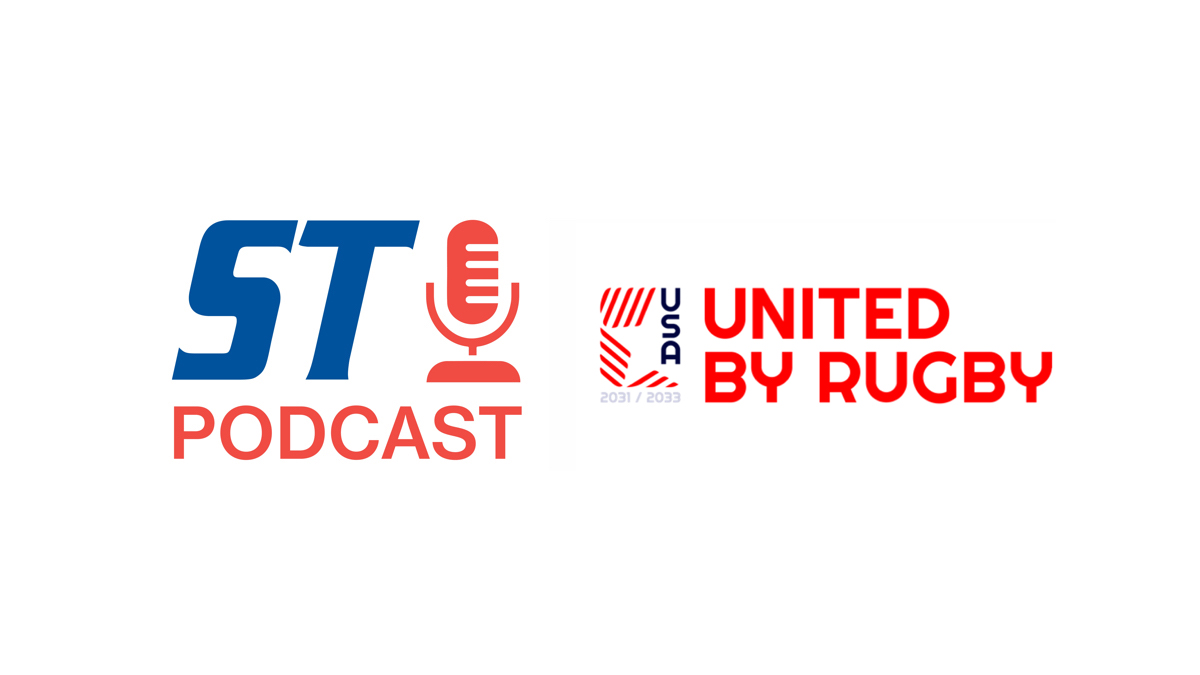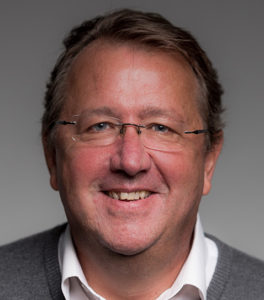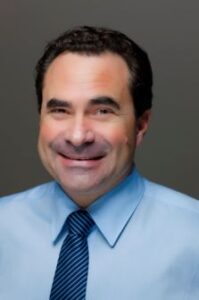
The United States will host the Rugby World Cup in 2031 and Women’s Rugby World Cup in 2033, planting a flag in the ground for the sport stateside by World Rugby, the international federation in charge of the event. The announcement also completes a remarkable comeback for USA Rugby, which filed for Chapter 11 bankruptcy in March 2020 before it emerged from bankruptcy last year. In this episode, SportsTravel Managing Editor Matt Traub talked with USA Rugby CEO Ross Young and bid chairman Jim Brown about the bid process, the emotions of World Rugby’s official announcement, deciding on 2031 and 2033 for the tournaments it wanted to host, what this will mean for the sport throughout the United States, what the organization learned from hosting the 2018 Rugby Sevens World Championship in San Francisco and much more.
Among the topics featured in this episode:
-

USA Rugby CEO Ross Young Ross Young on the awarding of the Rugby World Cup and Women’s Rugby World Cup to the U.S. (2:13): “It’s a huge milestone and everyone knows that. You know, the union was struggling pre-COVID and in how we operated in general within the environment. So we’d started a process before then about building out a proper foundational strategic plan and building an operation and business case around how that was going to work. And the World Cup was always the potential to be a catalyst for that or an anchor for those plans. … And it was certainly important as we were going through the bankruptcy process to ensure that we kept the momentum going on it. Now we’re at this stage where we really can move forward with certainty around building that plan. The emotions are there not just around the fact that this event will be happening. It’s the opportunity of building a sustainable environment for USA Rugby on the back of that awarding.”
- Jim Brown on the bidding process from when he first started to today (3:53) : “I think there were days where yes, I have to say I felt quite bullish and I think I’m quoted as saying we’re quite bullish about the opportunity of not only hosting, but doing a really good job for the sport of rugby, for the United States and the communities of rugby. But there were days where I was like, ‘uh oh, this is feeling like it’s a long shot and I just can’t believe it’s possibly going to happen.’ Certainly the momentum of the last four or five months have been consistent in the right direction and fairly positive. … We’re quite bullish about the opportunities that this’ll lend rugby and the United States in general, to adjust the sports landscape a little bit in the United States would be a good way of putting it.”
- Young on the runway it gives USA Rugby to continue building the sport in the U.S. (5:31): “The word legacy is thrown around and has been thrown around for years around one of the big benefits of hosting a major sports event. Legacy is great, but legacy by the definition of the word is what comes after. What we’ve talked about is building a legacy plan, but starting from the awarding. So for me, it’s an opportunity to work with World Rugby, to build out a plan with the right stakeholders, with the people from MLR, with our various constituents across the senior game, the college game, the youth game … And what’s been really refreshing is the open nature of the discussions with World Rugby and them wanting to partner with us to unlock the (sport’s) true potential and make it work. So from a grassroots perspective and building on what we have in to the playing base, the coaching base, the referee base in respects, it is a massive opportunity.”
-

USA Rugby World Cup Bid Committee Chair Jim Brown Brown on what the commercial impact for rugby will be over the coming years (8:29): “There really are two real developmental or growth initiatives. One is the sport itself. Ross and the team are very focused on and rightly so (on) making sure that we increase the numbers of participants, we increase the number of fans, we increase the quality of the top teams, et cetera. But then the marketing side is the other piece. … I’ve been involved for almost two years now, (and) the number of interest in all of this is a good barometer. And I think it’s really impressive the reaction and the interest being expressed, which I think will translate to commercial increases for sure.”
- Brown on the bid committee’s working relationship with World Rugby over the process (12:05): “I have to say having dealt with other event owners, namely the ones I’ve worked for in the IOC and FIFA, I think the relationship with World Rugby, primarily led with Ross as our primary interface, is probably the cornerstone of the success of everything for us and for them. The partnership feeling we had from day one, the open communication we’ve had from day one and really the sincere honesty in terms of them saying they really want this to happen — I wouldn’t say from day one, but when they could finally say it, it’s been very open. And I think our openness and honesty was quite a response to theirs. If they needed anything, we were able to provide it to them unfiltered and straightforward. And I think that’s going to allow us to really hit the ground running. … At a certain point we viewed our bid not necessarily as a bid, but really the beginning of the planning. And I think a lot of good work has already happened in preparation for it.”
- Young on the decision to host in 2031 for the men and 2033 for the women, having previously explored 2027 for the men and 2029 for the women (17:37): “The outcome we’ve got here is because we’ve had this great managed process of discussions and tying in strategically what World Rugby is doing with a women’s game in general (and) talked about bringing more focus. It’s the fastest growing rugby event in the world is the Women’s Rugby World Cup. … (2031 and 2033) made more sense, especially having lost a couple of years of playing due to COVID and strategically building in and combining those events … that gives an opportunity to keep on exponentially raising the profile and the quality and combining the funding of both events and the opportunities for sponsors (and) partners by linking the events in the same territory…. not just for the U.S. which has a thriving women’s sport marketplace anyway, but for World Rugby really to make that statement around the women’s game is a huge opportunity that we’re really excited about.”
- Young on learning from when the U.S. hosted the 2018 Rugby Sevens World Championship in San Francisco (19:38): “I think the single biggest thing for us was ensuring that you’d done all your due diligence before committing to hosting the event. And that wasn’t done for 2018. It was a huge operational success and with over 100,000 people across the weekend, the biggest and most successful Sevens World Cup to date. But there were mistakes made in the long-term planning and that’s something that we’ve done from the start here. When we asked Jim to do a feasibility study, before we put our hand up to start doing the bid, was to go back and learn some of those lessons and they have been implemented. It’s obviously a completely different event as being a multi-city, multi-weekend event instead of just a week-long event that it was in San Francisco.”
- Brown on the timeline for when host cities in U.S. will be announced for the 2031 and 2033 events (22:56): “Our hope is to finalize and along with World Rugby to be able to have selected the host cities before the 2027 World Cup in Australia. So between four and five years out, I think that’s a standard and allows enough time to really focus on whatever the number of cities in the end will be selected to get ready to host in 2031. Most of the cities … are interested in both 2031 and 2033. There’s a couple that are only interested in 2033 and there’s a few that are really primarily focused on 2031. We could add more in the future for sure, depending on who and what reasons. But right now we’re very happy with the number we have and we will pare down those numbers for the next four or five years to build toward a final selection.”
- Young on building the game throughout the country by partnering with potential host cities until 2031 (24:08): “Having the number of cities that we have, we certainly want to maximize opportunities of hosting bigger games, more test matches, more regular games in the U.S. from the men’s and women’s perspective. Having access to those cities in this environment now gives us an opportunity to run test events and see how effective different marketing initiatives, different sports commissions are, et cetera. And working with NFL teams, which was successful in Washington with the Washington Commanders in FedEx Field in DC, it was a good example of how that could work. We’ll certainly use to maximize those relationships over the buildup. … We certainly don’t want to lock this in as an only list. If there are developments confirmed, new stadiums come into being then yeah, we want to have them as part of that process. But saying that, we’re so happy with the list that we’ve got, the geographical spread and the opportunities that those great venues in a bunch of great cities around this country and their keenness and willingness to get involved in this project.”
This episode is sponsored by:

















 Copyright © 2025 by Northstar Travel Media LLC. All Rights Reserved. 301 Route 17 N, Suite 1150, Rutherford, NJ 07070 USA | Telephone: (201) 902-2000
Copyright © 2025 by Northstar Travel Media LLC. All Rights Reserved. 301 Route 17 N, Suite 1150, Rutherford, NJ 07070 USA | Telephone: (201) 902-2000